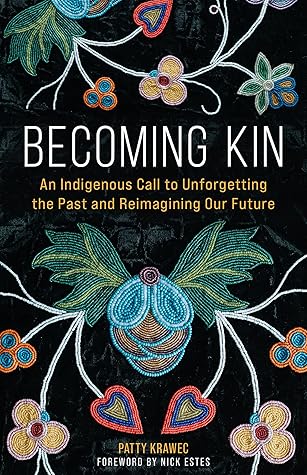More on this book
Community
Kindle Notes & Highlights
by
Patty Krawec
When we return to ourselves, we undo the colonialism that has gotten inside our heads.
The trick is to get those assumptions from where they rest inside you or inside our broader society out to a place where you can articulate them. To move those unspoken things from implicit to explicit so they can be challenged or reconsidered.
As we prepare to reconsider the history that we have learned, look for Black and Indigenous people. Look for us in your life, on your bookshelf, in the music you listen to and the movies or television you watch. Look for us on your social media feed. Look for us in the collective nostalgia of your country. Don’t try to read too much into our presence or absence. Just notice. Where are we?
Most Indigenous societies did not recognize a strict gender binary, being perhaps more comfortable with transitional spaces than European Christians. Binaries create exceptions, and exceptions require names and ever-expanding rainbows and letters to make sure everyone is included.
Americans admire this desire to boldly go and then bravely defend themselves from those who resent discovery. Discovery, after all, has never been good for those it has uncovered. It inevitably leads to exploitation and death.
Developers still say that it “isn’t being used” when they want to develop an area of land. But that only means that people aren’t using it in a particular way.
At the time of early European settlement, land ownership was understood differently. You owned land because you used it, not because you bought it.
Race is not biologically real, not in the sense that you can tell somebody’s race by testing their blood or measuring their skull. It’s a social construct, like marriage and citizenship: an idea that got mapped onto humans, replacing relationships with identity and then attaching rights to that identity—rights like who could own land and who could be owned.
Too often the descendants of European Christians see themselves as persecuted Israelites rather than as members of the invading state of Babylon: an empire that imposes systems of oppressive leadership over the people of the land for the purpose of control and prosperity.
Every American Indian in the United States and Canada has been touched by the residential school system in one way or another. The generational trauma that resulted from decades of this policy is incalculable. There is the loss of language and stories, the loss of relationship. There is the deliberate forgetting of our personal histories to avoid the pain of not forgetting. This destruction of what was ours replaced our languages with French, English, and Spanish; our stories with the Bible; and our systems of kinship with isolated nuclear families. These losses have been woven into our
...more
Indian boarding schools were an attempt by the governments of the United States and Canada to change the language, religion, and social structure of Indigenous societies and homogenize everyone into the same way of thinking and living. Although these schools predate the UN Genocide Convention by over fifty years, they meet the criteria of that definition of genocide.


